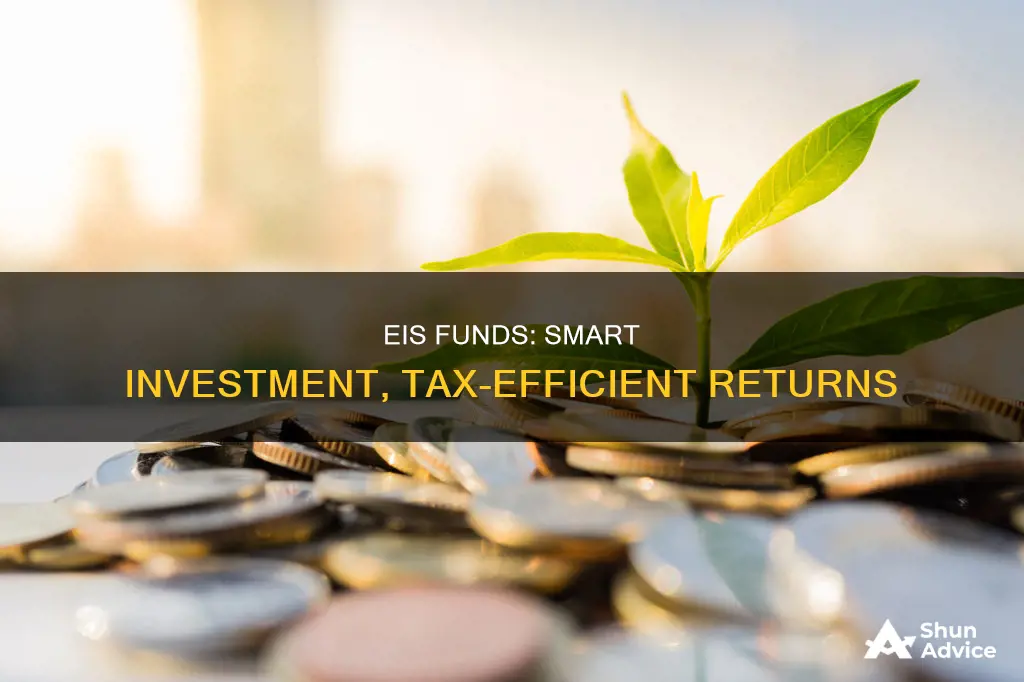
The Enterprise Investment Scheme (EIS) is a government-backed initiative that provides tax relief to investors who invest in small, new, or risky businesses. The scheme is designed to boost economic growth by making it easier for smaller companies to raise capital and stimulate job creation. Investors in EIS can benefit from a range of tax reliefs, including income tax relief, tax-free growth, loss relief, capital gains deferral, and inheritance tax relief.
EIS funds are a simple way for investors to build a portfolio of early-stage businesses or startups. While EIS investments carry a high level of risk, they offer the potential for high growth and provide valuable tax relief. It's important to note that EIS is intended for experienced or wealthy investors as part of a diversified portfolio.
| Characteristics | Values |
|---|---|
| High growth potential | Access to shares in small businesses with high growth potential |
| Tax relief | Income tax relief, tax-free capital gains, loss relief, inheritance tax relief, deferral of capital gains tax |
| Investing in the future | Support young, innovative companies |
| Diversify investment portfolios | Access to smaller companies with different investment cycles |
| Complements other long-term investments | Long-term investments with unique benefits and risks |
| Tax planning opportunities | Various tax reliefs |
| Supporting the UK economy | Funding for entrepreneurially-minded businesses, creating jobs and stimulating economic growth |
What You'll Learn

High growth potential
EIS investments can give investors access to businesses that they may otherwise be unable to hold and that have the potential to greatly increase in value. Many companies looking for EIS funding are aiming for significant growth, and investors can share in that success by buying shares in a business that’s at the start of its growth journey.
The government offers EIS tax reliefs to encourage people to invest in early-stage businesses with high growth potential. They do this because smaller businesses that mature into successful, established companies create jobs and stimulate economic growth in the UK. Since EIS was launched in 1994, more than 53,000 qualifying early-stage businesses have benefited from £30 billion of investment. In 2021-22 alone, £2.3 billion was raised by companies that qualified for EIS.
EIS funds are an easy way to build an investor an investment portfolio of start-ups or early-stage companies. The decision regarding the opportunities to be chosen for the portfolio’s make-up will typically be taken on the investor’s behalf by the fund’s manager.
EIS funds are designed for individuals who are keen to have shares in smaller companies that have great potential to expand to several times their existing value but who also feel comfortable with the risks associated with backing recently launched businesses and remaining invested over a long period.
The tax breaks offered by the government for investing in EIS funds are very attractive. The longevity of EIS funds is also a top advantage—although government initiatives are regularly introduced and then discontinued when ministerial personnel change or the political direction shifts, EIS has now been in existence for several decades and there is no sign that it is likely to be discontinued any time soon.
Emergency Fund Placement: Where in Your Portfolio?
You may want to see also

Tax relief
Income Tax Relief
EIS investors can claim income tax relief of up to 30% on investments of up to £1 million per tax year (or £2 million if at least half of this is invested in knowledge-intensive companies). This equates to a tax reduction of up to £300,000 per year, or £600,000 for married couples who are opting to double their investments.
Capital Gains Tax Relief
There is no capital gains tax to pay on the sale of shares held for at least three years. In addition, it is possible to defer CGT payments by investing gains into an EIS-qualifying company.
Loss Relief
If an investor's EIS investment fails, they can claim loss relief. Losses can be offset against income tax liability at the marginal income tax rate of 20% for basic-rate taxpayers, 40% for higher-rate taxpayers, and 45% for additional-rate taxpayers.
Inheritance Tax Relief
Investments in EIS funds can be passed to beneficiaries without any inheritance tax being payable, as long as the investor has held the investment for a minimum of two years.
Funding Sources for Private Investment: Where Does Money Come From?
You may want to see also

Investing in the future
The Enterprise Investment Scheme (EIS) is a government-led initiative that has been supporting the UK economy since 1994. It provides a valuable source of funding to early-stage companies, while offering tax benefits to investors. EIS-qualifying companies are typically young, innovative companies that find new solutions to everyday problems or create something that didn't exist before.
The EIS grants investors 30% of what they pay for shares as a credit that reduces their individual income tax owed for the year. This is especially valuable for this type of high-risk investment. The scheme also eliminates capital gains tax on those shares when the individual decides to sell.
The government offers these tax reliefs to encourage people to invest in early-stage businesses with high growth potential. Smaller businesses that mature into successful, established companies create jobs and stimulate economic growth in the UK. Since its launch, more than 53,000 qualifying early-stage businesses have benefited from £30 billion of investment. In 2021-22 alone, £2.3 billion was raised by companies that qualified for EIS.
By making an EIS-qualifying investment, you have the potential to grow your own wealth and support future UK economic growth.
High growth potential
Many companies looking for EIS funding are aiming for significant growth. For investors, it’s an opportunity to share in that success by buying shares in a business that’s at the start of its growth journey.
Tax relief
Due to the higher risk of investing in EIS funds, investors are given a valuable tax relief package that includes loss relief, tax-free capital gains, income tax upfront relief, inheritance tax relief, and deferral of capital gains tax.
The chance to support UK businesses
When you invest in EIS funds, you can help smaller innovative companies in the UK to create more jobs, enjoy greater prosperity, and promote improved economic growth nationwide.
A complement to long-term investments
Investing in EIS funds is a good option to complement your other longer-term investments when it comes to diversifying your investment portfolio.
S&P Mutual Funds: A Smart Investment Strategy
You may want to see also

Diversify investment portfolios
Diversifying your investment portfolio is a key consideration for anyone looking to invest. EIS funds are a great way to achieve this.
Firstly, EIS funds are an easy way to build a portfolio of start-ups or early-stage companies. The fund manager will typically decide which opportunities to include in the portfolio on your behalf, giving you access to a wide range of sectors and companies. This means your portfolio can be diversified across multiple sectors, reducing your exposure to risk from any one source.
Secondly, EIS funds allow you to invest in smaller companies with high growth potential. These companies often follow different investment cycles compared to other parts of the market, so EIS can offer an extra layer of diversification for investors comfortable with the risk of investing in smaller companies.
Additionally, EIS funds can complement your existing long-term investments, such as ISAs, VCTs, and pension funds. They are a good option for investors looking to add a high-risk, high-growth component to their portfolio.
It is important to remember that EIS investments are high-risk and illiquid, so they are most suitable for experienced investors with a long-term investment horizon who are comfortable with the potential for losses.
Mutual Fund Investors: Owners of a Diverse Portfolio
You may want to see also

Complements other long-term investments
EIS shares are long-term investments that come with a unique set of benefits and risks. They are designed to complement other mainstream long-term investments such as ISAs, VCTs and pension funds.
EIS funds are a good option for investors who want to diversify their investment portfolios. They are designed for individuals who are keen to own shares in smaller companies with great potential for expansion but who are also comfortable with the risks associated with backing recently launched businesses and remaining invested over a long period of time.
EIS funds are an easy way to build an investment portfolio of start-ups or early-stage companies. The fund manager typically decides which opportunities to include in the portfolio.
EIS funds are particularly attractive to investors with a large income tax bill who are looking for growth opportunities. The EIS allowance is one of the most generous.
EIS funds could also appeal to investors with capital gains tax liabilities. They offer tax-free capital gains and the ability to defer capital gains tax.
EIS funds are also a good option for investors who want to support UK businesses. They help smaller, innovative companies in the UK to create more jobs, enjoy greater prosperity and promote improved economic growth nationwide.
Best Banks for Investment: Where to Invest Your Money?
You may want to see also
Frequently asked questions
There are several reasons to consider investing in EIS funds, including:
- High potential for growth: EIS funds can give investors access to businesses with high growth potential that they may not be able to invest in otherwise.
- Tax relief: Due to the high risk of investing in EIS funds, investors are offered valuable tax relief, including loss relief, tax-free capital gains, income tax upfront relief, inheritance tax relief, and deferral of capital gains tax.
- Supporting UK businesses: Investing in EIS funds helps smaller, innovative companies in the UK create jobs, grow and promote economic growth.
There are several significant risks associated with investing in EIS funds, including:
- Capital at risk: EIS investment values may fall, and investors may not be able to recoup their investment.
- Tax treatment: The tax treatment of EIS investments depends on individual circumstances and may change in the future. Tax reliefs depend on the company maintaining its qualifying status for EIS.
- Long-term investment: Investors must hold their shares for a minimum of three years to keep any claimed tax reliefs and should be prepared to hold their shares for much longer to allow time for the business to grow and exit the investment.
- Liquidity and volatility: Investing in small companies can be more volatile, and it may be harder to sell shares.
EIS stands for Enterprise Investment Scheme. It is a government-sponsored investment program in the United Kingdom that provides tax relief to investors who invest in smaller, riskier, and/or new businesses. The scheme helps these companies raise capital and contribute to economic growth through production and job creation.







